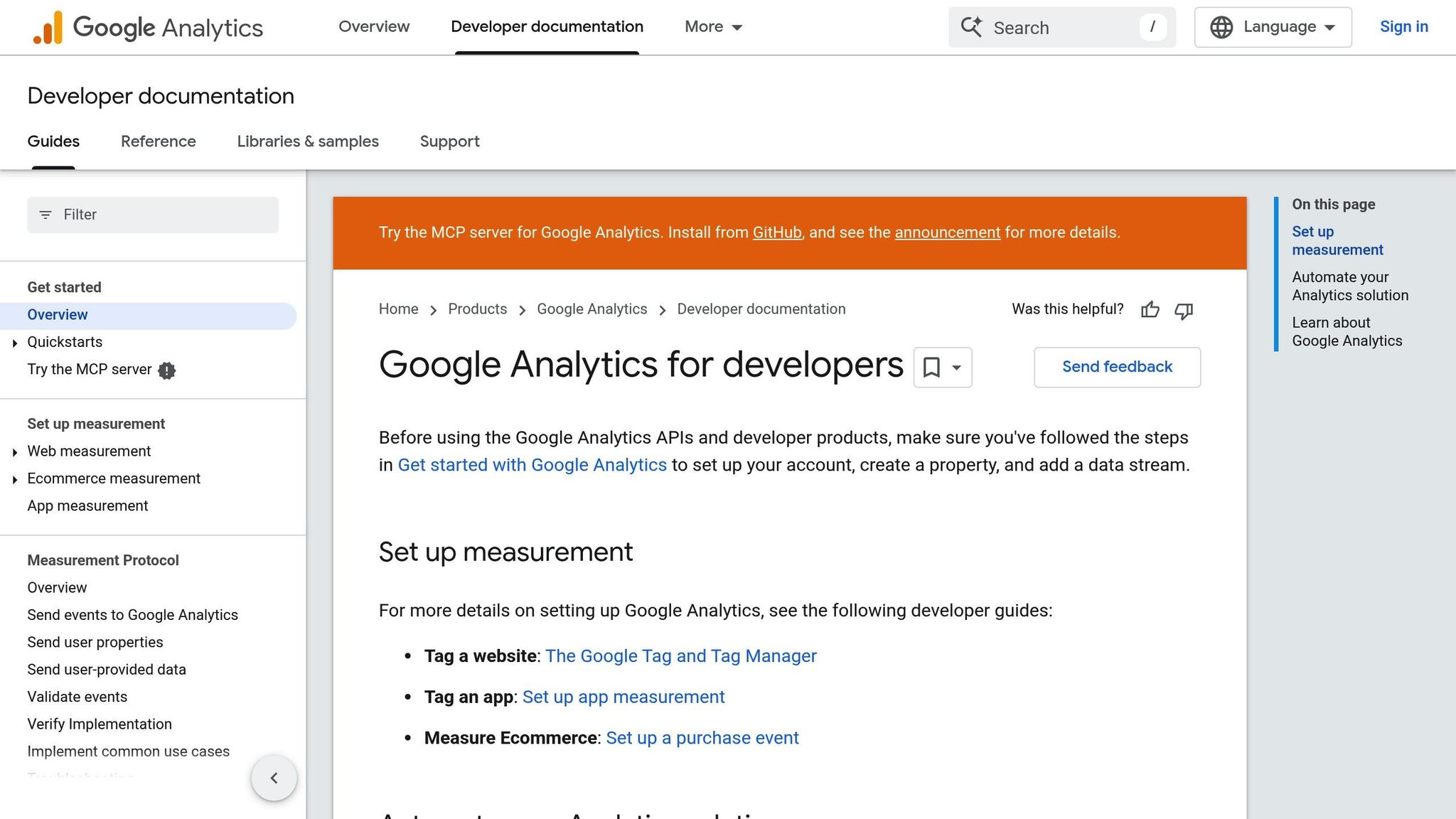Measuring SEO ROI in iGaming boils down to one key question: Are your organic search efforts driving real revenue growth? Here’s how you can track and analyze it effectively:
- SEO ROI Formula: Use
(Revenue from SEO - SEO Costs) / SEO Costs × 100to calculate your return. - Key Metrics to Track: Monitor organic traffic, keyword rankings, player acquisition cost (PAC), lifetime value (LTV), churn rate, and net gaming revenue (NGR).
- Challenges: Attribution issues, regulatory hurdles, and SERP volatility make tracking ROI in iGaming complex.
- Tools to Use: Platforms like Google Analytics 4, Search Console, Semrush, and Ahrefs help monitor performance and link traffic to revenue.
- Actionable Insights: Focus on high-converting keywords, optimize underperforming pages, and address technical SEO issues.
iGaming SEO is competitive and requires precise tracking to justify investment and drive growth. Use data-driven strategies to refine campaigns and demonstrate results to stakeholders.
How to Track SEO ROI in 5 Minutes (I Tracked $1,597,828.33 Easily)
Key Metrics for Measuring SEO ROI
To effectively measure SEO ROI in the iGaming sector, it’s crucial to focus on metrics that link your organic search strategies to tangible business outcomes. A well-rounded approach combines traffic, conversion, and engagement metrics to paint a clear picture of performance. Let’s break down these categories and see how they contribute to measurable ROI in iGaming.
Organic Traffic and Keyword Rankings
Organic traffic volume is one of the first metrics to monitor. By tracking monthly organic traffic to your casino website, you can gauge how many users are discovering your site through search engines. Unlike paid advertising, organic traffic builds over time without a corresponding increase in costs, making it a sustainable growth driver.
Keyword rankings are another cornerstone metric. Studies show that most users click on one of the first three search results, making it essential to rank as high as possible. As one expert puts it, "If your iGaming SEO strategy is working, your rankings will go up over time". Regularly reviewing keyword performance and using rank tracking tools can help you spot any drops, particularly since Google’s core updates often impact gambling sites, classified as YMYL (Your Money or Your Life) content.
To refine your efforts, tools like Semrush Traffic Cost can help you assess traffic quality and prioritize high-value keywords and topics. Given that over 60% of searches now come from mobile devices, it’s also important to track performance separately for mobile and desktop users.
While traffic and rankings are essential, they’re just the starting point. The real impact lies in how effectively traffic converts into revenue.
Conversion Metrics and Player Value
Conversion metrics are where organic traffic translates into measurable revenue. Some key metrics to track include Player Acquisition Cost (PAC), Lifetime Value (LTV), Churn Rate, Average Revenue Per User (ARPU), and Net Gaming Revenue (NGR). These metrics directly connect SEO performance to financial outcomes.
Start by defining what counts as a conversion for your business, whether it’s player registrations, first deposits, or active gameplay. Then, set up conversion tracking specifically for organic traffic. For most iGaming operators, SEO-driven registration rates are a primary conversion metric, followed closely by deposit conversion rates.
Player Lifetime Value (LTV) is particularly important for calculating long-term ROI. Knowing the profitability of players acquired through organic search justifies continued investment in SEO. Operators who closely monitor these metrics have reported up to a 30% improvement in marketing returns.
"Understanding and utilizing metrics like CAC, LTV, and conversion rates is crucial for any successful campaign. Our expertise ensures that clients reach and exceed their marketing goals through data-driven insights."
– Toby Oddy, CEO of Digital Fuel Performance
Optimizing conversions based on player data can yield impressive results. In fact, targeted efforts can increase conversion rates by up to 45%, significantly boosting ROI. Focus on analyzing high-performing keywords that drive both traffic and conversions, and consider using A/B testing to refine content elements and improve outcomes.
| Metric | Key Benefit | Use Case |
|---|---|---|
| Conversion Rate | Links traffic to revenue outcomes | Evaluating the success of marketing campaigns |
| Retention Rate | Measures long-term player satisfaction | Improving loyalty programs and reducing acquisition costs |
| Churn Rate | Detects dissatisfied players | Identifying at-risk users and enhancing retention strategies |
Backlink Quality and User Engagement
Beyond traffic and conversions, backlink quality and user engagement are vital for assessing your SEO strategy’s effectiveness.
Backlink quality plays a major role in search rankings and trustworthiness. Regularly check the number and quality of backlinks from reputable gambling and sports-related sites. These links not only boost your domain authority but also improve your site’s visibility in search results.
User engagement metrics help you understand how well your organic traffic performs. Key indicators include session duration, bounce rate, and the frequency of play. These metrics reveal whether your site is attracting engaged players or casual visitors. For instance, players who spend more time on your site or return frequently are more likely to convert and generate higher lifetime value.
Additionally, tracking in-game purchases can provide deeper insights into the quality of SEO-driven acquisitions. To get the clearest picture, separate these metrics from other traffic sources to isolate the impact of your SEO efforts.
Keep a close eye on bounce rates from organic traffic. A high bounce rate could signal that your content isn’t fully addressing the search intent, giving you an opportunity to refine your approach.
How to Calculate SEO ROI Step by Step
To determine the return on investment (ROI) from your SEO efforts, you need to combine key metrics into a clear, actionable formula. This involves tracking revenue generated by SEO, calculating your total investment, and applying the standard ROI formula. Let’s break it down step by step, using examples from the iGaming industry to make it more concrete.
Track Revenue from SEO Traffic
The first step is connecting organic traffic to revenue. This requires setting up proper tracking systems to monitor how visitors from search engines convert into paying customers and understanding their value to your business.
Start by implementing conversion tracking in tools like Google Analytics. This allows you to follow the entire player journey – from their initial search to registration, first deposit, and ongoing activity. SEO expert Rayhan highlights this approach:
"To measure ROI from paid SEO tools, track metrics like improved keyword rankings, organic traffic growth, higher conversion rates, and revenue generated from SEO efforts. Compare these results with the cost of the tool to determine profitability. Tools like Google Analytics can help link SEO performance to business outcomes."
Next, monitor conversion rates at each stage of the player funnel. For example, track the percentage of visitors who register, make their first deposit, and continue to engage with your platform. This data is essential for understanding the value of your SEO traffic.
Finally, calculate the lifetime value (LTV) of players acquired through organic search. In the iGaming industry, where players often remain active over time, knowing their long-term value is crucial. Consider factors like their average deposit size, frequency of gameplay, and retention rates.
For instance, if your SEO efforts bring in 1,000 new player registrations each month, with 25% making a deposit and an average LTV of $280 per player, your monthly SEO-driven revenue would be:
1,000 × 0.25 × $280 = $70,000
Calculate Total SEO Investment
The next step is to calculate your total SEO costs, including both direct and indirect expenses. Many businesses overlook hidden costs, which can lead to inaccurate ROI calculations.
Direct costs are straightforward and include agency fees, SEO tools, and content creation. In the competitive iGaming space, these costs can be substantial due to market-specific challenges and regulations. For example, smaller operators might spend $500–$1,000 monthly on SEO services, while larger companies could easily exceed $10,000.
Tool and software costs also add up. Subscriptions for rank tracking, analytics platforms, and content creation tools should be factored into your budget.
Internal team costs and additional expenses often make up a significant portion of the total investment. If you have an in-house SEO team, allocate their salaries proportionally to the time spent on SEO tasks. For example, if an SEO manager earning $80,000 annually dedicates 50% of their time to organic search, you’d allocate $40,000 to your SEO budget. Don’t forget additional costs like website maintenance, technical audits, link building, and conversion optimization, which can add 20–30% to your total budget.
Here’s an example of a quarterly SEO investment for a mid-sized iGaming operator:
| Cost Category | Quarterly Amount |
|---|---|
| SEO Agency Retainer | $12,000 |
| SEO Tools & Software | $1,200 |
| Content Creation | $4,500 |
| Internal Team (50% allocation) | $15,000 |
| Technical Audits & Maintenance | $2,800 |
| Total SEO Investment | $35,500 |
Apply the ROI Formula
Once you have your revenue and cost figures, you can calculate your ROI using this formula:
(SEO Revenue – SEO Costs) / SEO Costs × 100
For example, if your quarterly SEO revenue is $210,000 and your total investment is $35,500, the calculation would look like this:
($210,000 – $35,500) / $35,500 × 100 = 491%
This means for every dollar spent on SEO, you earned $4.91 – a strong performance in the competitive iGaming market.
When evaluating ROI, keep in mind that SEO often takes three to six months to show significant results. Quarterly or annual assessments are more meaningful than monthly evaluations.
Also, consider attribution challenges. A player might find your site through organic search but convert after interacting with a paid ad or visiting directly. Tools like Google Analytics offer attribution models to give you a clearer picture of SEO’s role in your overall revenue.
For businesses focused on lead generation rather than direct sales, ROI calculations may require additional steps. Track actions like form submissions or callback requests, then multiply by the average lead value to estimate revenue.
Take the example from RevenueZen, where $70,000 in organic conversions came from a $10,000 SEO investment, resulting in a 600% ROI. While outcomes vary depending on factors like competition and execution quality, effective SEO strategies can yield impressive returns.
sbb-itb-9f85f22
Tools for Measuring SEO ROI
A combination of free tools and specialized platforms is crucial for effectively tracking SEO performance and ROI in the iGaming industry.
Google Analytics 4 and Search Console

Google Analytics 4 (GA4) and Google Search Console are essential for any SEO strategy, offering complementary insights that together provide a comprehensive view of organic performance.
- Google Analytics 4: Tracks key metrics such as page visits, session lengths, and conversions. For iGaming operators, this means monitoring everything from initial visits to player registrations and deposit completions. Its advanced e-commerce tracking also reveals user purchasing behaviors, helping you better understand player value.
- Google Search Console: Focuses on pre-visit data, such as impressions, clicks, and the search queries driving traffic to your site. This is particularly useful for identifying high-converting keywords.
When you link these tools, you can unify keyword insights and conversion data for a clearer picture. For example, connecting Search Console to GA4 allows you to view search query data directly in GA4, making it easier to identify which terms drive the most valuable traffic. You can also create custom organic traffic reports using dimensions like "Session Default Channel Group" or "Session source/medium" to isolate SEO performance.
To make data presentation easier, Google Looker Studio consolidates these insights into visual dashboards. This is especially useful when sharing ROI data with stakeholders, as it maps the entire journey from search query to revenue generation.
SEO expert Anastasia Kotsiubynska from SE Ranking highlights the importance of these tools:
"Google Analytics (GA) helps understand all your organic traffic data (search engines, landing pages, etc.) and how people behave on your website. With GA4, SEOs can spot when content is not engaging enough, or it’s even irrelevant (e.g., that has a low average time on page or a high bounce rate). This might be a sign that your content is not of the highest quality, or you do not match a search intent."
For deeper insights, specialized iGaming analytics platforms can take your data analysis further.
iGaming Analytics Platforms
While Google’s tools provide a solid foundation, iGaming-specific analytics platforms offer advanced insights that are tailored to the gaming industry. These platforms track player behavior, Average Revenue Per User (ARPU), and Lifetime Value (LTV) – metrics critical for calculating ROI.
These tools are designed to follow the entire player journey, from deposit frequency and game preferences to retention rates. This level of detail allows for more precise ROI calculations across various acquisition channels, including organic search.
- ARPU and LTV Tracking: These platforms provide detailed breakdowns of how SEO-acquired players perform compared to other channels. This is essential for understanding the true value of SEO-driven traffic.
- Attribution Modeling: Many platforms account for the complex player journey in iGaming, where users might discover your brand via organic search but convert later through retargeting ads or email campaigns.
By layering these insights with data from Google tools, you can refine your SEO strategy and boost ROI. To further enhance your analysis, professional SEO tools are indispensable.
SEO Performance Tracking Tools
Dedicated SEO platforms like Ahrefs and Semrush are key for monitoring the metrics that drive organic revenue. These tools provide in-depth analysis of keyword rankings, backlink quality, and competitor strategies.
- Semrush: Known for its wide range of features, including traffic analytics, backlink analysis, rank tracking, and site audits. For iGaming operators, its competitor analysis tools are particularly valuable, allowing you to see which keywords your competitors rank for and estimate their organic traffic value.
- Ahrefs: Offers similar features but stands out with its user-friendly sidebar for quick access to reports like broken links, internal links, and anchor text analysis. This simplifies the process of identifying and fixing technical SEO issues.
- Ubersuggest: A budget-friendly alternative starting at $29/month, offering basic keyword research, backlink analysis, and SEO audit reports.
| Tool | Monthly Cost | Best For | Key Features |
|---|---|---|---|
| Semrush | $99+ | Comprehensive analysis | Traffic analytics, competitor research, rank tracking |
| Ahrefs | $99+ | Backlink analysis | Link building, keyword research, technical SEO |
| Ubersuggest | $29 | Budget-conscious operators | Basic keyword research, site audits |
These platforms help measure improvements in keyword rankings, organic traffic, and backlink quality – metrics that directly impact ROI. By combining these insights with revenue data from GA4 and iGaming analytics platforms, you can pinpoint which SEO activities yield the best results and refine your approach accordingly.
To maximize effectiveness, use these tools together rather than relying on any single platform. Google tools provide conversion and revenue data, iGaming analytics platforms deliver player-specific insights, and professional SEO tools reveal the drivers behind those results. This multi-layered approach ensures you have a clear understanding of your SEO ROI.
How to Use SEO ROI Results
Once you’ve measured your SEO ROI, it’s time to put that data to work. Numbers alone won’t drive change – what matters is how you interpret and act on them. Your ROI results should inform your strategy, help secure stakeholder support, and refine your SEO practices moving forward.
Present ROI Data to Stakeholders
When presenting SEO ROI to business leaders, visual dashboards are your best friend. Stakeholders don’t want to wade through endless spreadsheets – they need clear, actionable insights that tie directly to business outcomes.
Start with visuals that highlight key trends. For example, use line graphs to show monthly organic traffic alongside revenue growth. This makes it easy to connect SEO efforts to tangible results. Instead of just saying, “Organic traffic increased,” show how that growth translated into more player acquisitions, higher deposits, or improved lifetime value. Keep in mind that nearly half of marketers consider SEO the highest-performing channel, with Google reporting its ROI is over five times higher than paid search advertising.
Monthly or quarterly reports can further strengthen your case. Include visuals and case studies that demonstrate how SEO improvements have driven revenue growth. Unlike paid ads, which stop yielding results the moment the budget runs out, SEO builds momentum over time. Year-over-year comparisons are especially effective in showcasing this cumulative value.
Case studies are another powerful tool. Transform raw data into compelling narratives that highlight achievements like increased revenue, better keyword rankings, or higher engagement. Specifics matter – timeframes and percentage improvements make your story more persuasive.
As marketing strategist Mark Mehling aptly puts it:
"SEO is like the air in a car tire. Nobody notices or thinks about it as long as it’s working. But as soon as the air is gone from the tire it gets everyone’s attention!"
Use analogies like this to help stakeholders grasp SEO’s essential role in digital success.
Use ROI Data to Improve SEO Strategy
Your ROI data isn’t just for show – it’s a roadmap for refining your SEO strategy. Use these insights to focus on what’s working and fix what’s not.
Start by addressing technical SEO issues. If you’re seeing traffic growth but weak conversion rates, check for foundational problems. Ensure all pages are indexed, fix 404 errors, implement schema markup, and test mobile-friendliness. These small fixes can significantly improve user experience and boost conversions.
Next, analyze which pages and keywords deliver the best ROI. Assign high-performing keywords to relevant pages and create supporting content around those topics. This helps smooth the user journey and increases the likelihood of conversions.
If certain pages attract traffic but fail to convert, tweak elements like headlines, calls-to-action, or page layouts. Even small adjustments can make a noticeable difference in performance. Additionally, use your data to identify new opportunities. For instance, if game-related keywords are driving high-value traffic, develop more content targeting those themes.
Stay proactive by setting up alerts in Google Search Console and conducting monthly performance reviews. This allows you to catch and address issues early. Also, keep up with industry trends by following SEO experts, joining professional groups, and attending iGaming conferences. Algorithm updates can have a big impact on your ROI, so staying informed is key.
Choose the Right Attribution Model
Attribution models play a crucial role in accurately measuring SEO ROI, especially in complex industries like iGaming. Players often interact with multiple touchpoints – discovering your brand through organic search, returning via direct traffic, and converting through an email campaign. Choosing the right model ensures you’re giving proper credit to each step in the customer journey.
Here’s an overview of common attribution models:
| Attribution Model | Best For | Advantages | Limitations |
|---|---|---|---|
| First-Click | Brand awareness campaigns, short sales cycles | Simple; credits initial discovery | Overlooks nurturing activities |
| Last-Click | Direct conversions, simple funnels | Tied directly to revenue | Undervalues early SEO efforts |
| Linear | Equal-value touchpoints | Recognizes all activities equally | Unrealistic weighting |
| Time Decay | Long nurture cycles | Focuses on touchpoints closer to conversion | Undervalues early interactions |
| U-Shaped | Longer sales cycles with distinct phases | Balances early discovery and final conversion | May miss middle-stage contributions |
| Data-Driven | Complex buyer journeys with enough data | Machine learning ensures accurate credit allocation | Needs substantial traffic data |
For industries like iGaming, where customer journeys involve multiple steps, multi-touch attribution models work best. For instance, a player might find your site through an SEO-optimized blog, return directly, and finally convert via email.
If you have the traffic volume, data-driven attribution is the most precise option. It uses machine learning to analyze customer behavior and assigns credit to the touchpoints that most influence conversions. However, before implementing any model, ensure all stakeholders agree on its goals. Collaboration between marketing and sales teams is critical – companies with strong alignment here are 67% better at closing deals.
Conclusion and Key Takeaways
Wrapping up this guide, it’s clear that combining precise measurement, ongoing refinement, and expert strategies is essential to getting the most out of your SEO efforts in the iGaming industry. Measuring SEO ROI in this space isn’t just about tracking numbers – it’s about creating a sustainable, data-driven approach that fuels genuine business growth. With organic search contributing to 40% of business revenue and 49% of marketers identifying it as the most effective channel for returns, nailing your measurement strategy is a must.
Steps to Measure SEO ROI Effectively
Accurately measuring SEO ROI requires following a structured approach:
- Track Revenue from SEO Traffic: Use proper attribution and conversion tracking to tie revenue back to SEO efforts.
- Calculate Total SEO Investment: Include all internal and external costs tied to your SEO campaigns.
- Apply the ROI Formula: Use the formula (Value of Conversions – Investment) / Investment to measure the impact of your efforts.
Focus on actionable metrics like organic growth, rankings for high-intent keywords, conversion rates, and player lifetime value. Tools like Google Analytics 4, Search Console, and specialized iGaming analytics platforms are essential for tracking these metrics. Additionally, tagging campaigns and projects lets you evaluate the performance of individual SEO initiatives.
"SEO should ultimately be about revenue. Just like every other marketing channel."
These steps provide the foundation for ongoing improvement.
Continuous Optimization: A Necessity, Not an Option
Measuring SEO ROI isn’t something you do once and forget. It’s a continuous process, especially in a fast-evolving industry like iGaming. With the market expanding rapidly, competition is intensifying, and algorithm updates are happening more frequently, directly influencing your ROI.
Regular monitoring is crucial to identify problems early and seize new opportunities. For example, trends like skill-based games, crash games, and metaverse gaming bring fresh keyword opportunities. And with mobile gaming dominating the landscape, optimizing for mobile experiences is more important than ever.
Search engine algorithm updates can disrupt your ROI overnight. To stay ahead, conduct monthly performance reviews, set up alerts in Google Search Console, and stay updated on industry changes through conferences and professional networks. A mindset geared toward constant adjustment ensures you remain competitive in this dynamic space.
Why Partner with an iGaming SEO Expert?
The complexity of iGaming SEO makes working with a specialist invaluable. Generic SEO agencies often lack the nuanced understanding required to navigate this industry’s unique challenges, such as licensing rules, compliance issues, and the metrics that truly matter – like player value beyond just traffic numbers.
Did you know that SEO leads have a 14.6% close rate, compared to just 1.7% for outbound efforts? That’s a huge difference, but in the iGaming space, success depends on a tailored approach. An experienced iGaming SEO consultant can help you build E-E-A-T signals (experience, expertise, authority, and trustworthiness) by addressing licensing transparency, demonstrating expertise, and fostering user trust. They’ll also help you weed out harmful links that could undermine your SEO efforts, all while ensuring compliance with complex gambling regulations.
Partnering with experts like Emilio Takas SEO Consulting gives you access to industry-specific strategies and insights. With a focus on iGaming SEO, analytics, and conversion optimization, they can help align your efforts with both search engine standards and legal requirements.
Investing in specialized expertise not only sharpens your ROI measurement but also enhances your overall strategy, paving the way for stronger growth in one of the most competitive digital markets.
FAQs
How can iGaming businesses accurately measure the ROI of their SEO campaigns given the complex customer journey?
To effectively measure the ROI of SEO campaigns in the iGaming industry, it’s crucial to use sophisticated attribution models that reflect the complex, multi-channel journeys players often take. Tools like multi-touch attribution and real-time tracking allow you to analyze every interaction a player has with your site – from their first search to their final conversion. This gives a much clearer understanding of how SEO contributes to your revenue.
Key metrics such as player lifetime value (LTV), cost per acquisition (CPA), and organic traffic growth are essential for linking SEO initiatives to measurable business results. By focusing on these metrics, you can uncover the true impact of your SEO efforts, even when dealing with the intricate user paths that are so common in the iGaming world.
What are the key SEO metrics to track for boosting player acquisition and retention in the iGaming industry?
To boost player acquisition and retention in the competitive iGaming industry, keeping an eye on specific SEO metrics is essential. These metrics shed light on player behavior, profitability, and engagement levels:
- Daily Active Users (DAU) and Monthly Active Users (MAU): These numbers reveal how often players are engaging with your platform.
- Average Revenue Per User (ARPU) and Lifetime Value (LTV): These help measure the profitability of individual players over time.
- Retention Rate and Churn Rate: These indicators show how well you’re holding onto players versus losing them.
- Conversion Rate: This tracks how efficiently visitors are turning into active players.
- Session Length: Understanding how long players stay engaged can provide clues about their activity patterns.
By analyzing these metrics, you can refine your SEO strategies to attract more players, keep them engaged, and ultimately increase your return on investment. These insights are key to staying ahead in the ever-evolving iGaming market.
Why should you work with an iGaming SEO expert to boost your SEO ROI?
Working with an iGaming SEO expert can greatly improve your SEO results by attracting the right audience, boosting player interaction, and driving more conversions. These specialists are well-versed in the complexities of the iGaming industry and can develop strategies that align with your specific business objectives.
Their knowledge helps increase your site’s presence in search engine results, draw in high-value players, and optimize customer lifetime value. The result? Better-performing SEO campaigns and a stronger return on your marketing investment.





